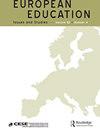PISA和欧洲教育改革:政策惯性、回避和折射的案例
IF 0.9
Q4 EDUCATION & EDUCATIONAL RESEARCH
引用次数: 1
摘要
摘要:本研究在爱沙尼亚、意大利、法国和芬兰等欧洲国家中研究了PISA结果与其对政策制定的影响之间的关系。这些国家反映了与PISA结果相关的四个不同结果:(1)高成就和高公平(爱沙尼亚);(2)业绩停滞(意大利);(3)低成就、低公平(法国);(4)负资产趋势(芬兰)。讨论认为,这些结果可能与政策惯性、回避和折射有关。本文章由计算机程序翻译,如有差异,请以英文原文为准。
PISA and Education Reform in Europe: Cases of Policy Inertia, Avoidance, and Refraction
Abstract The present analysis examined the relationship between PISA results and their influence on policy development within a select group of European nations which included Estonia, Italy, France, and Finland. These countries reflect four distinct outcomes in relation to PISA results: (1) high achievement and high equity (Estonia); (2) stagnant performance (Italy); (3) low achievement and low equity (France); and (4) a negative equity trend (Finland). The discussion argues these outcomes can be associated with cases of policy inertia, avoidance, and refraction.
求助全文
通过发布文献求助,成功后即可免费获取论文全文。
去求助
来源期刊

European Education
EDUCATION & EDUCATIONAL RESEARCH-
CiteScore
1.20
自引率
0.00%
发文量
5
期刊介绍:
uropean Education is published in association with the Comparative Education Society in Europe (CESE). It is an international peer-reviewed journal devoted to original inquiries and dialogue on education across the member states of the Council of Europe. Established in 1969, the journal features articles on education in individual member states, comparative studies on education across Europe, as well as the impact of European education initiatives globally. The journal especially encourages theoretical and empirical studies, interdisciplinary perspectives, and critical examination of the impact of political, economic, and social forces on education. European Education includes reviews of books and educational films, including those published/produced in English and other languages.
 求助内容:
求助内容: 应助结果提醒方式:
应助结果提醒方式:


